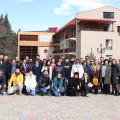To what extent do you consider the First Artsakh War to be sufficiently reflected in Armenian literature?
One cannot say that the First Artsakh War occupied a major place in the Armenian literature of those times, but to insist on the opposite (even though it was not fully mentioned or recounted, it did not have its own place) would also not be true. There were some fragments, some small, tangible pieces, but they had a velvety surface – this was how it ended up being represented. But this was justified, even more than justified. A great literary response, a great artistic response could not be that active and quick, like a child’s reflex. It needed to be processed, which required time. And it was processed, but it got lost along the way. Some stories, some novellas remained, yes, but apologies to anyone who thinks otherwise, it never ended up heralding a new self-contained era for our literature (and perhaps there was no real need for this). This justifiable pause was caused by the post-war difficulties of newly-independent Armenia. After all, a portion had been plucked off a huge and connected body (the Soviet Union), which was now trying to survive with its infrastructure in a state of collapse. And while this was an important story for its people, it was not a crucial one, and that is what hampered things. That same stamping that had gone on for centuries, which was finally being overcome in the culture that came with the 1960s and 1970s, once again started to take over, becoming a monotonous rumination like somebody chewing gum.
As for reflection… as a nation, we constantly avoid any kind of reflection.
In what way can this war be reflected in our literature?
It is early—way too early—to think about this. Yes, there were defeats in some of our stories (like Sargis Hovsepyan’s Flat Stone, Karen Avetisyan’s notes, with their fragmented images), but the most important is yet to come. Things will be processed this time and they will not be lost like with the first war. The pain—the deep pain that causes moaning, wells up one’s eyes but also forces one to smile—has not gone away, and is not leaving anytime soon. Literature is borne, above all else, by problems. And we have more than enough problems. But when we fall… when a child falls flat on his face, he does not think in that moment of pain about picking the dried blood off his knee with his small fingers and gathering the flakes of clot in his hand. Our literature is now closer to picking the dried wounds off our knees, it is not thinking about this fall. That moment, that explosion of emotion will come soon for sure.
For many years, we have seen that Armenian and Azerbaijani or Armenian and Turk intellectuals and civil society actors have met and participated in various seminars both in Yerevan and Baku as well as in several corners of the world, with considerable grants spent on these events. Why was all of this unable to serve its purpose, globally speaking, of establishing peace and reconciliation, and why did the Second Artsakh War take place?
During that whole process, we were like victims of self-deception and self-proclaimed peacemakers. We have exaggerated the role of the intellectuals. In societies that have not yet succeeded, where writers remain unread and unknown, scientists are scoffed, actors are mocked and called clowns, intellectuals have been and remain players in the background – self-contained and miserable, even in the most generous of descriptions. Let us try to recall a few things together – do we recognize the bare minimum of people in the field of literature (from readers to writers)? Literature is supposed to be for mass reading, houses should be full of books, there should be no lack of newly published books in our libraries, and so on and so forth… yes, this should be taken to court!



